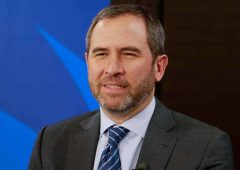Thailand Prepares to Launch Cryptocurrency Payment Pilot in Phuket to Boost Tourism
09.01.2025 22:00 1 min. read Alexander Zdravkov
Thailand is preparing to test a new cryptocurrency payment system in Phuket, aiming to integrate digital currencies into its existing legal framework.
Finance Minister Pichai Chunhavajira revealed the initiative, emphasizing that the project would not require new laws and would operate within current regulations.
The pilot program will allow foreign tourists to register their cryptocurrencies through Thai exchanges, use them for transactions after identity verification, and convert them into Thai baht through a clearinghouse. Chunhavajira highlighted the growing demand for digital currencies like Bitcoin, particularly in the tourism and property sectors, suggesting that paying with Bitcoin could offer a simpler solution for people fleeing political instability.
As Thailand looks to strengthen its tourism sector, which is expected to welcome 39.8 million visitors by 2025, the government is also eyeing global trends in cryptocurrency adoption. Despite the optimism, some experts warn that the country could fall behind in the crypto space without taking more strategic action. Jirayut Srupsrisopa, CEO of Bitkub Capital, stressed that Thailand’s delay in establishing a Bitcoin reserve could cost the country in the long run.
While the government moves cautiously, cryptocurrency adoption is already happening at the grassroots level. In Kalasin province, businesses in the Huay Phueng district have started accepting Bitcoin for everyday purchases, showing how local communities are embracing digital assets.
-
1
Here is Why the Fed May Cut Rates Earlier Than Expected, According to Goldman Sachs
08.07.2025 15:00 2 min. read -
2
What Brian Armstrong’s New Stats Reveal About Institutional Crypto Growth
29.06.2025 15:00 2 min. read -
3
Donald Trump Signs “One Big Beautiful Bill”: How It Can Reshape the Crypto Market
05.07.2025 9:56 2 min. read -
4
Market Odds of a U.S. Recession in 2025 Drop in Half Since May
05.07.2025 18:30 2 min. read -
5
Vitalik Buterin Warns Digital ID Projects Could End Pseudonymity
29.06.2025 9:00 2 min. read
BitGo Files Confidentially for IPO With SEC
BitGo Holdings, Inc. has taken a key step toward becoming a publicly traded company by confidentially submitting a draft registration statement on Form S-1 to the U.S. Securities and Exchange Commission (SEC).
Crypto Greed Index Stays Elevated for 9 Days — What it Signals Next?
The crypto market continues to flash bullish signals, with the CMC Fear & Greed Index holding at 67 despite a minor pullback from yesterday.
U.S. Public Pension Giant Boosts Palantir and Strategy Holdings in Q2
According to a report by Barron’s, the Ohio Public Employees Retirement System (OPERS) made notable adjustments to its portfolio in Q2 2025, significantly increasing exposure to Palantir and Strategy while cutting back on Lyft.
Key Crypto Events to Watch in the Next Months
As crypto markets gain momentum heading into the second half of 2025, a series of pivotal regulatory and macroeconomic events are poised to shape sentiment, liquidity, and price action across the space.
-
1
Here is Why the Fed May Cut Rates Earlier Than Expected, According to Goldman Sachs
08.07.2025 15:00 2 min. read -
2
What Brian Armstrong’s New Stats Reveal About Institutional Crypto Growth
29.06.2025 15:00 2 min. read -
3
Donald Trump Signs “One Big Beautiful Bill”: How It Can Reshape the Crypto Market
05.07.2025 9:56 2 min. read -
4
Market Odds of a U.S. Recession in 2025 Drop in Half Since May
05.07.2025 18:30 2 min. read -
5
Vitalik Buterin Warns Digital ID Projects Could End Pseudonymity
29.06.2025 9:00 2 min. read


